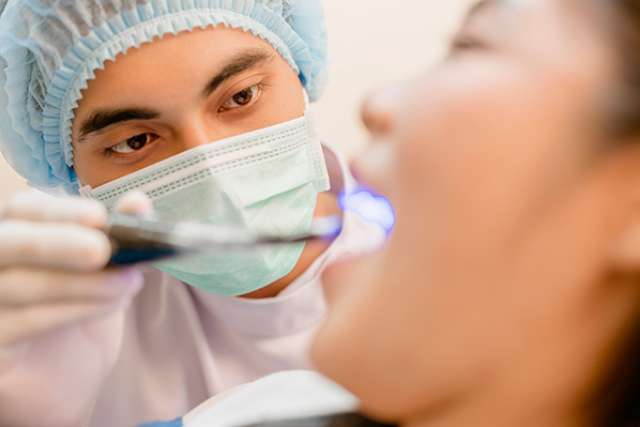A new policy brief from the UCLA Center for Health Policy Research shows that low-income California adults are less likely to receive timely dental care like regular checkups and are more likely to visit the dentist for specific problems than those with higher incomes — a fact that holds true even for low-income residents who have dental insurance.
The study authors found that among those adults with the lowest incomes, 59% had seen a dentist within the last year, compared with 80% for higher-income residents. The disparity persisted even for those with private dental insurance, with 75% of the lowest-income adults and 85% of higher-income residents having had a dental visit in the past year.
The findings are based on an analysis of 2017 and 2018 data from the center's California Health Interview Survey that looked at how disparities in income and insurance status may affect adult Californians' access to oral health care. Those with incomes at or below 138% of the federal poverty level were considered to be in the lowest-income category, while higher-income residents had incomes at or above 250% of the FPL.
The researchers found that among the lowest-income adults, 64% had public dental insurance through Medi-Cal, 16% had private insurance and 20% had no insurance at all. While having dental insurance alleviated some disparities for those with the lowest incomes, the type of insurance also appeared to play a role in access, the authors say. Those with Medi-Cal, for instance, were less likely than those with private insurance to have visited a dentist in the past six months (41% vs. 56%) and were more likely to have seen a dentist for a specific problem (43% vs. 31%).
The authors stress that dental care and dental insurance are not affordable to all Californians. The Affordable Care Act does not consider dental care an essential benefit, many employers do not include dental benefits in their employment-based health insurance plans and private dental policies are costly. Furthermore, many dentists don't participate in Medi-Cal due to lower provider reimbursement levels.
"Our findings indicate that dental insurance improves access to dental care for all, just as the rising tide lifts all boats, but income disparities in access still remain," said Nadereh Pourat, lead author of the study and associate director of the center. "Oral health is an integral part of overall health, and the lowest-income individuals have the least access and suffer the consequences. It is important to break down silos that perpetuate disparities in access to dental care. We can start by promoting parity in dental insurance."
Among their recommendations, the authors suggest that policies be established to include dental care as an essential health benefit and to promote the availability of affordable dental insurance options.
Other key findings of the policy brief include:
- 41% of adults in the lowest-income group visited the dentist for specific problems, versus 23% in the higher-income group.
- 69% of higher-income adults have private health insurance, while only 16% of the lowest-income adults do.
- 28% of uninsured lowest-income adults saw a dentist in the past six months, compared with 57% of uninsured higher-income residents.
"The study aligns with others that show that individuals with low incomes have fewer checkups and less access to timely care than people in higher income groups," said Maria Ditter, co-author of the study and a research analyst at the center. "It is evident that we need policies that improve the availability of dental insurance. We need to ensure fair and equitable access to services, regardless of income."
The authors note, however, that the economic effects of the coronavirus pandemic may make enacting these policies and achieving parity challenging.
"These disparities could broaden with the COVID-19 pandemic because of the rising rates of unemployment and loss of employment-based dental insurance," Pourat added. "The loss of tax revenues will also have a negative impact on coverage, particularly for the lowest-income adults who are Medi-Cal beneficiaries, because Medi-Cal dental benefits are optional."
The study is accompanied by an infographic (PDF) that shows access to dental care among California's older adults, a group which tends to lose their dental insurance after retirement.



